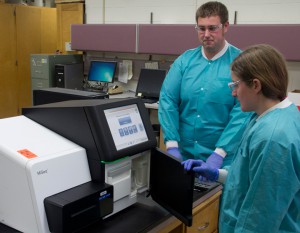
WSLH Microbiologists Rich Griesser and Tonya Danz performing Whole Genome Sequencing testing on influenza viruses.
A pilot project at the Wisconsin State Laboratory of Hygiene (WSLH) to perform Whole Genome Sequencing on influenza viruses received the Excellence in Domestic Partnering Award from the National Center for Immunization and Respiratory Diseases (NCIRD) at the Centers for Disease Control and Prevention (CDC).
The WSLH is in the first year of a 3-year project funded by the CDC to pilot Next Generation Whole Genome Sequencing of influenza viruses submitted for surveillance from Wisconsin and other states.
The WSLH is the first state public health laboratory in the country to collaborate with the CDC on this cutting-edge technology. The WSLH has been 1 of 3 CDC-designated National Influenza Surveillance Reference Centers since 2009.
Genetic characterization of influenza viruses is important both for monitoring genetic drift (how the virus may be changing) and for selecting the virus strains to include in influenza vaccines. Next Generation Sequencing (NGS) in state public health laboratories could potentially shave months off the vaccine development process.
“This is a big recognition at CDC,” said Dr. Peter Shult, director of the WSLH Communicable Disease Division and Emergency Response. “I am very proud of the hard work of our staff, especially (microbiologists) Tonya Danz and Rich Griesser, (electronic laboratory reporting coordinator) Mary Wedig, and our WSLH IT staff. This type of public health work is what the WSLH is all about.”
Previous Stories about the Project
Building a Better Flu Vaccine
Getting CLARITY on Whole Genome Sequencing
